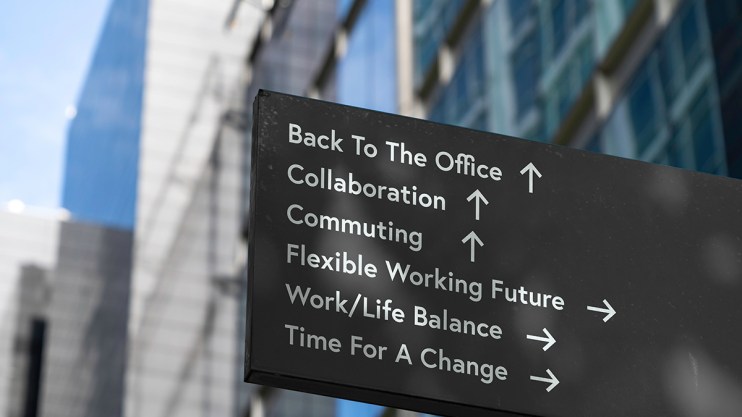Five New Ways We’re Doing Hybrid Work

We’ve come a long way since March 2020. Most workers will easily recall the day they were told to pack up their laptops and work from home for the foreseeable future. The Covid-19 pandemic revealed many companies were not prepared for remote working, and led to a whirlwind of uncertainty.
The workforce adapted quickly. In 2021, research carried out by Momentive found that 50% of Londoners would prefer to go back to the office if asked, and 36% of working Londoners were doing so on a hybrid basis. At that time, almost a fifth of UK businesses claimed they were switching to remote work entirely.
Three years later, the picture has become clearer. As the dust settles post-pandemic, we’re entering a new phase of the way we work, and facing new challenges. Now, 60% of IT and CX professionals believe that the workplace will be predominantly hybrid by 2030, according to the Future of Work: 2030 Vision Report.
Thirty-three percent believe that the future of work will accommodate fully remote or work from anywhere options, leaving only 7% who believe that work will return predominantly to an in-office model.
As companies and organisations struggle to find a balance for workforces with radically different ideas of what the new rules should be, they are also juggling worker satisfaction and productivity with rising costs, and diminishing company culture.
In the midst of these challenges, we’re seeing new hybrid working trends emerging. Discover five of them below.
1. Thursday is the new Friday
Hybrid working means that the traditional work week as we know it is changing. Say goodbye to the Monday-Friday office 9-5, now workers are choosing to come in across Tuesday and Wednesday, with Thursday being the most popular day.
According to recent data published by analysts Placemake.io and Visitor Insights, most hybrid workers in the UK prefer to work from home on Mondays and Fridays, extending their weekends. Coincidentally (or not) this also lines up neatly with Thursday post-office drinks.
2. Output over hours
The only way for a hybrid work environment to be successful is to focus on staff productivity rather than the number of hours each employee has worked. For example, it could take one employee an hour to complete a task. However, their colleague might need two hours. Both are equally productive.
As a result, we’re going to see more and more companies focusing on things like objectives and key results (OKRs) and KPIs instead of fixating on clocking in and clocking out––which seems to work in employees’ favour.
3. Wellbeing is key
If the pandemic taught us anything it was the importance of physical and mental wellbeing. In 2023, leading employers will be focused on supporting their hybrid workers so they can have a decent work-life balance.
This will take many forms such as health insurance and ample annual leave. Younger hybrid workers in particular want more robust benefit packages that will include yoga, meditation, and mental health support.
4. Culture will be crucial
It’s very hard to foster company culture over Zoom. Companies that want to have more collaboration and bonding are starting to come up with new and inventive ways to get their employees together.
Some are hosting team breakfasts once a week, others share company-wide trips. We’ve started to see a new trend called “spike” or “focus” weeks, where everyone has to come together in the office to strategise or work on big projects.
5. Flexibility will go further
As we enter a more permanent era of hybrid work, we’re going to see it expand beyond desk-bound professionals who work in fields like tech or finance. It will start to include frontline workers too.
According to a 2022 Gartner survey of 405 frontline worker managers, 58% of organisations that employ frontline workers have invested in improving their employee experience in the past year; about one-third of those who haven’t said they intend to do so in the next 12 months.
If you want to guarantee a hybrid schedule, a new job could be the solution. Discover three hybrid roles below, and find thousands more on the City A.M. Job Board.
Senior Project Manager, Citi, London
Citigroup is looking for an experienced Senior Project Manager to join the technology team. This new hire will take on a leadership role and coordinate/deliver a complex client onboarding programme. Key competencies include significant experience in project or programme management within financial services and a strong track record of managing client expectations across different geographical locations. Get more information here.
Infrastructure Engineer, Starling Bank, London
Digital challenger bank, Starling is searching for an Infrastructure Engineer who will be working with functional delivery teams to translate business requirements into technical implementations, designing and building patterns and frameworks to be used by engineering teams, and taking ownership of projects and ensuring timely delivery. Starling’s technology teams work in a hybrid pattern. You can choose to work fully from home ,or call into one of its three offices in London, Southampton, or Cardiff. Get all the details on this role here.
Project Manager, Sky, London
If you have a passion for delivering a great customer experience and driving innovation, then this Project Manager job could be the role for you. You will take ownership of a diverse variety of projects, using excellent project management, technical, and organisational expertise to understand the business and strategic goals and drive the implementation to success. Sky has embraced hybrid working, with its team splitting their time between working in unique office spaces and at home. You’ll find out more here.
Apply for all of these jobs and many more on the City A.M. Job Board today